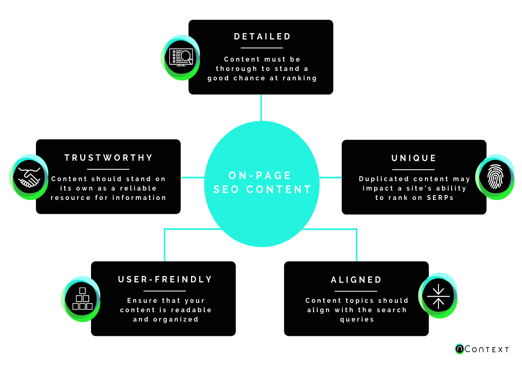The 3 Types Of SEO - And Why You Need All Of Them
When you think of SEO (Search Engine Optimization), what comes to mind? Keywords! While that is an integral part of SEO, there's a lot more to it. There are multiple types of SEO that are all important to a successful SEO strategy. At its core, SEO focuses on expanding a business's visibility in organic search results and improves its SERP (Search Engine Results Page) rankings. Using a range of SEO tactics to optimize your site for greater visibility will increase traffic and drive quality users to your site. Here are three SEO tactics that can help improve your visibility and rankings through organic search results.
1. On-Page SEO
As a marketer, on-page SEO is likely the type you are most familiar with. This specific type of SEO refers to optimizing your web page's content and source code to increase your site's visibility on SERPs. A good on-page SEO strategy aids search engines in serving users with high-quality content about a particular search query. In essence, the goal of on-site SEO is to allow both search engines and users to:
● Understand the context of the webpage
● Identify the page as related to a search query
● Locate a page that has been optimized to rank well on SERPs
Previously, a good on-page SEO strategy focused on conventional methods like using exact-match keywords in particular locations across your website. Search engines have evolved to extract a page's meaning from the use of synonyms, the frequency with which specific word combinations are mentioned and the context in which content appears. This allows marketers to focus on relevance and how the content on the page relates to the user intent behind search queries. Webpages with solid on-page SEO have detailed, unique, trustworthy, user-friendly content aligned with user search intent.
Maintaining an on-page SEO strategy is essential to increasing the quantity and quality of users on your website. Much of this optimization is concentrated on the user and ensuring that their experience from the search engine to your website is seamless and aligned with their search query.
2. Off-Page SEO
Off-page SEO refers to actions taken outside of your website to impact your SERP rankings. By optimizing for off-site ranking factors, you are not only able to instill trust and authority but also improve the perception of your site's popularity and relevance in the digital space. Among types of off-page SEO, there are two main types we should dive into: link-related and non-link-related.
● Link-Related SEO: Building backlinks is the core of off-page SEO. Search engines use these backlinks to indicate the content's quality, and those that contain many "high-value" backlinks are likely to rank higher in the SERP. There are three main types of links: natural links, manually built links and self-created links. Let's take a deeper look at these three.
Natural Links: These links are given without any action needed by the website owner. For example, this could be a blogger linking to one of their (non-sponsored) favorite products.
Manually Built Links: These links are acquired through deliberate link-building activities such as incentivizing customers or influencers to share your content or site links.
Self-Created Links: This type of link is created by practices such as adding a backlink in an online directory, blog comment signature or press release.
● Non-Link-Related SEO: A majority of off-page SEO comes from earning links from external websites, but some non-link-related SEO strategies are essential to improve your search ranking position. One of the most common non-link-related SEO strategies is social media marketing. By driving traffic to your website from other online sources, you reference your site from elsewhere on the web. Some additional off-page SEO strategies include guest blogging, linked and unlinked brand mentions and influencer marketing.
3. Technical SEO
Last but certainly not least, let's take a look at technical SEO and why it’s an essential part of a well-rounded SEO strategy. Technical SEO relates to the non-content elements of your site and includes strategies to improve the backend structure and foundation of your web pages. More specifically, this type of SEO is used to improve a website's readability, making it easier for search engines to crawl and provides a good user experience. Ensuring your site offers a good user experience, you communicate to the search engines that your website is of high quality and should be shown more prominently in search results. Search engines prefer sites that maintain a low page load speed, are mobile-friendly, are easy to crawl and index, have good site architecture and structured data and are secure.
To develop an effective SEO strategy that leads to real results, you can't just focus on one type of SEO. Combining the different types of SEO mentioned in this blog gives your site the best chance to show up in search results. If you want to learn more about nContext's SEO services, head over to our Digital Marketing Services, or you can email info@ncontext.com.

